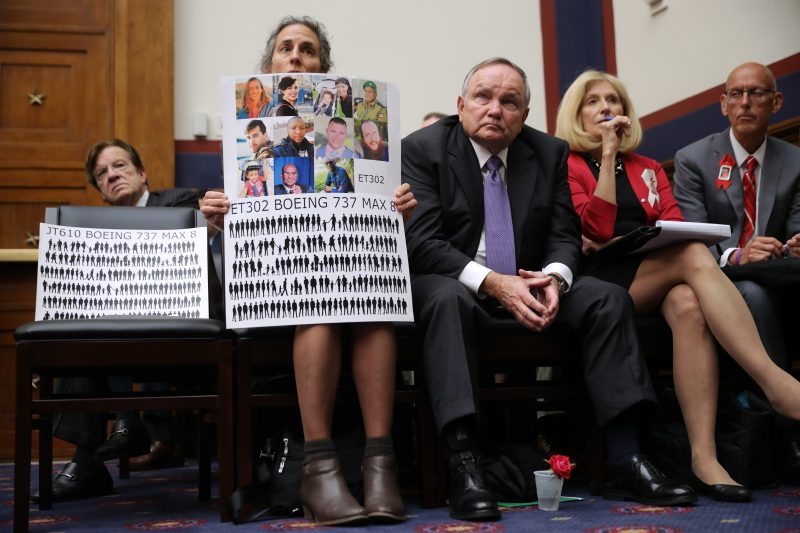Embattled Boeing to give $100 mn to 737 MAX crash victims’ families
Family members of victims in two fatal Boeing 737 MAX crashes appeared at a congressional hearing in May (CHIP SOMODEVILLA)
New York (AFP) – Boeing, under scrutiny after two crashes that claimed 346 lives, announced Wednesday it would give $100 million to communities and families affected by the 737 MAX disasters.
Describing the sum as an “initial investment” over multiple years, the company said it would work with local governments and non-profit organizations to provide “hardship and living expenses” and boost economic development in regions affected by crashes of planes operated by Ethiopian Airlines and Lion Air.
Boeing faces numerous lawsuits filed by the victims’ families, some of whom have appeared at news conferences or during congressional hearings probing the disasters.
The MAX was grounded globally after the Ethiopian Airlines crash in March and there is still no firm timetable for returning the planes to service.
The Federal Aviation Administration last week identified a fresh problem during simulator testing, further clouding the outlook for the plane’s return.
The company has been widely criticized over its development of the 737 MAX, which included a flight handling system called the Maneuvering Characteristics Augmentation System that has been seen as a factor in both crashes.
In both crashes, the MCAS pointed the plane sharply downward based on faulty sensor readings, hindering pilot control after takeoff, according to preliminary results from crash investigations.
Pilots have said they were not adequately trained on the MCAS system and that it was not disclosed to them, while the FAA has said it was kept in the dark for more than a year about a problem with a sensor linked to the system.
The $100 million figure is less than the list price for several leading 737 MAX planes. Boeing said it would also match donations from employees to families and communities affected by the accidents.
– MAX still grounded –
Boeing chief executive Dennis Muilenburg struck a note of contrition, saying the company is “focused on re-earning that trust and confidence from our customers and the flying public in the months ahead,” according to a company statement.
“We at Boeing are sorry for the tragic loss of lives in both of these accidents and these lives lost will continue to weigh heavily on our hearts and on our minds for years to come,” Muilenburg said.
“The families and loved ones of those on board have our deepest sympathies and we hope this initial outreach can help bring them comfort.”
Major carriers such as American Airlines and Southwest Airlines have pushed back the timeframe for returning the 737 MAX to service in light of the regulatory uncertainty.
Wall Street analysts have lowered their near-term profit targets on Boeing, due mainly to a halt in deliveries in new 737 MAX planes that has caused the company to cut production of the planes from 52 to 42.
A note earlier this week from JPMorgan Chase said further production cuts were possible in light of “heightened risk around timing” of the 737 MAX return.
The company is currently faced with a dilemma over whether to keep production high, which adds storage costs, or reduce output further, which stresses its supply chain.
Boeing booked $1 billion in added costs in the first quarter due to the production cut and “we assume there will be another hit in the second quarter,” the JPMorgan note said.
The $1 billion did not include any set-asides for litigation.
Boeing referenced “multiple lawsuits” in an April securities filing, saying it was also cooperating with various regulatory probes.
“We cannot reasonably estimate a range of loss, if any, that may result given the ongoing status of these lawsuits, investigations, and inquiries,” the company said in the securities filing.
Boeing shares ended up 0.1 percent at $354.47, underperforming major indices on a day when the Dow, S&P 500 and Nasdaq all notched fresh records.
Disclaimer: Validity of the above story is for 7 Days from original date of publishing. Source: AFP.


